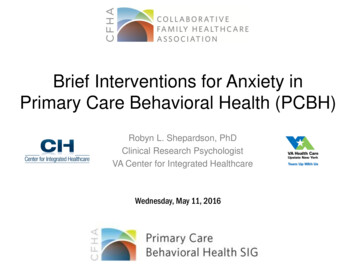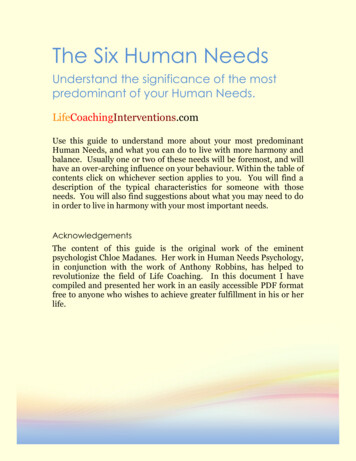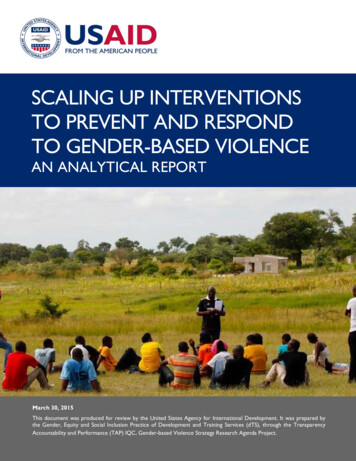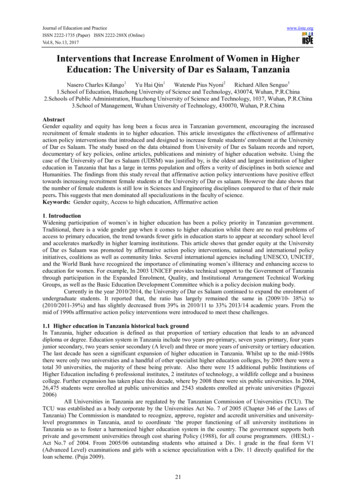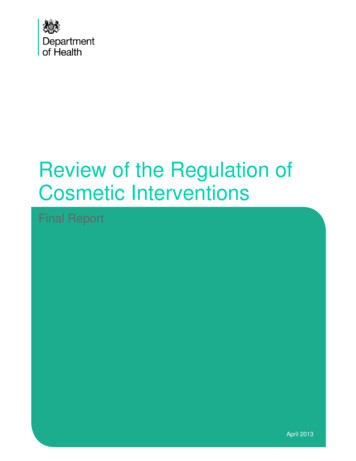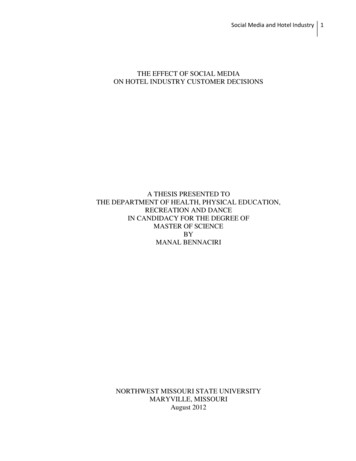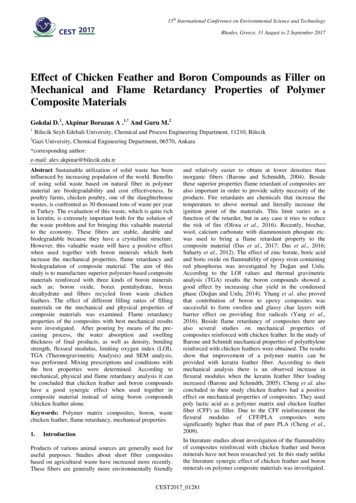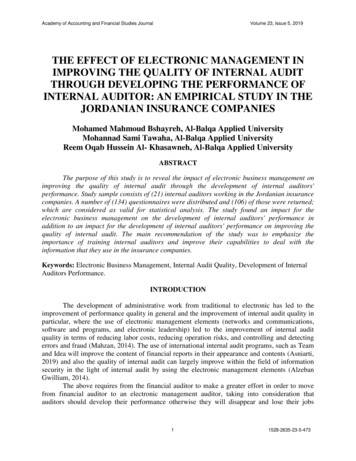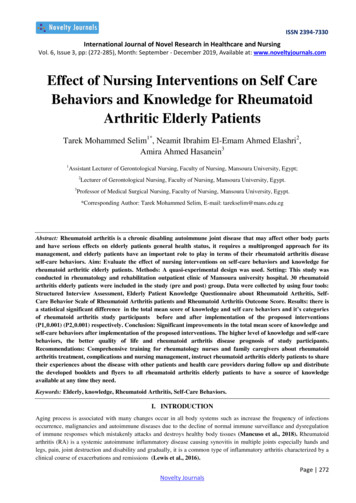
Transcription
ISSN 2394-7330International Journal of Novel Research in Healthcare and NursingVol. 6, Issue 3, pp: (272-285), Month: September - December 2019, Available at: www.noveltyjournals.comEffect of Nursing Interventions on Self CareBehaviors and Knowledge for RheumatoidArthritic Elderly PatientsTarek Mohammed Selim1*, Neamit Ibrahim El-Emam Ahmed Elashri2,Amira Ahmed Hasanein31Assistant Lecturer of Gerontological Nursing, Faculty of Nursing, Mansoura University, Egypt;2Lecturer of Gerontological Nursing, Faculty of Nursing, Mansoura University, Egypt.3Professor of Medical Surgical Nursing, Faculty of Nursing, Mansoura University, Egypt.*Corresponding Author: Tarek Mohammed Selim, E-mail: tarekselim@mans.edu.egAbstract: Rheumatoid arthritis is a chronic disabling autoimmune joint disease that may affect other body partsand have serious effects on elderly patients general health status, it requires a multipronged approach for itsmanagement, and elderly patients have an important role to play in terms of their rheumatoid arthritis diseaseself-care behaviors. Aim: Evaluate the effect of nursing interventions on self-care behaviors and knowledge forrheumatoid arthritic elderly patients. Methods: A quasi-experimental design was used. Setting: This study wasconducted in rheumatology and rehabilitation outpatient clinic of Mansoura university hospital. 30 rheumatoidarthritis elderly patients were included in the study (pre and post) group. Data were collected by using four tools:Structured Interview Assessment, Elderly Patient Knowledge Questionnaire about Rheumatoid Arthritis, SelfCare Behavior Scale of Rheumatoid Arthritis patients and Rheumatoid Arthritis Outcome Score. Results: there isa statistical significant difference in the total mean score of knowledge and self care behaviors and it’s categoriesof rheumatoid arthritis study participants before and after implementation of the proposed interventions(P1 0.001) (P2 0.001) respectively. Conclusion: Significant improvements in the total mean score of knowledge andself-care behaviors after implementation of the proposed interventions. The higher level of knowledge and self-carebehaviors, the better quality of life and rheumatoid arthritis disease prognosis of study participants.Recommendations: Comprehensive training for rheumatology nurses and family caregivers about rheumatoidarthritis treatment, complications and nursing management, instruct rheumatoid arthritis elderly patients to sharetheir experiences about the disease with other patients and health care providers during follow up and distributethe developed booklets and flyers to all rheumatoid arthritis elderly patients to have a source of knowledgeavailable at any time they need.Keywords: Elderly, knowledge, Rheumatoid Arthritis, Self-Care Behaviors.I. INTRODUCTIONAging process is associated with many changes occur in all body systems such as increase the frequency of infectionsoccurrence, malignancies and autoimmune diseases due to the decline of normal immune surveillance and dysregulationof immune responses which mistakenly attacks and destroys healthy body tissues (Mancuso et al., 2018). Rheumatoidarthritis (RA) is a systemic autoimmune inflammatory disease causing synovitis in multiple joints especially hands andlegs, pain, joint destruction and disability and gradually, it is a common type of inflammatory arthritis characterized by aclinical course of exacerbations and remissions (Lewis et al., 2016).Page 272Novelty Journals
ISSN 2394-7330International Journal of Novel Research in Healthcare and NursingVol. 6, Issue 3, pp: (272-285), Month: September - December 2019, Available at: www.noveltyjournals.comAround 1% of the world population affected by rheumatoid arthritis, it is the most common inflammatory arthritis(Rudan et al., 2015). It primarily affects the small joints of the hands and feet and, if not treated aggressively it can be amajor cause of disability, decreased quality of life, need for joint replacement surgery (Nikiphorou et al., 2014).Rheumatoid arthritis is the most common type of inflammatory arthritis in the older populations, it's incidence increaseswith aging until about the eighth decade of life (Ford et al., 2018).The specific causes of RA are unknown, but there are some factors that can increase the risk of developing the disease. Asfor most autoimmune diseases, RA results from a complex interaction of genetic and environmental factors. Moreover,female gender and family history are considered risk factors of RA (Ceccarelli et al., 2016).RA is associated with severe symptoms as aching pain, stiffness, tenderness and swelling in more than one joint, then thesame symptoms radiated to both sides of the body such as in both hands or both knees. Other symptoms' can occur weightloss, fever, fatigue, or tiredness and weakness (Smolen, 2019).The overall treatment approach of RA elderly patientsdepends upon the time and careful use of several types of therapeutic interventions. A number of non-pharmacologicmeasures and other medical interventions are important in the comprehensive management of rheumatoid arthritis(Feldthusen & Mannerkorpi, 2019).The purpose of RA elderly patient education is to provide them with adequateknowledge so that they can monitor and manage the symptoms caused by RA, improves their understanding andawareness of it's treatment regimen (Zangi et al., 2015). Self-care behaviors are specific actions which ease the diseasesymptoms, maintain and promote RA elderly patient health (Nadrian, Niaz, Basiri, & Roudsari, 2019). Gerontologicalnurses have a key and essential role in helping and supporting RA elderly patients and families by providing themknowledge about drug counseling and monitoring, exercise training, pain relief measures, which promote their self-carebehavior and health status which enhance elderly patient quality of life (Bech et al., 2019).Aim of the study: To evaluate the effect of nursing interventions on self-care behaviors and knowledge for rheumatoidarthritic elderly patients.Hypothesis of the study: Elderly patient who exhibit to rheumatoid arthritis nursing interventions will report higher levelof knowledge and improve their self-care behaviors.II. SUBJECTS AND METHODDesign: A quasi-experimental design was utilized. This study was conducted in rheumatology and rehabilitation unit ofMansoura university hospital. The present study included elderly patients diagnosed with rheumatoid arthritis, willing toparticipate in the study according the following criteria: Aged 60 years and above, both sexes, ability to comprehend andcommunicate.While elderly patients diagnosed with fourth grade rheumatoid arthritis were excluded.Sample size:The study included 30 rheumatoid arthritis elderly patients in (pre and post) group. The sample size was calculated bymedcalc software Based on the previous study by (Davis et al., 1994) at following: Type 1 error (α) 0.05, Type 2 error (β)0.2, Difference of means 4.83, SD pretest 5.29, SD posttest 4.19.Tools:Four tools were used for data collection:Tool I: Structured Interview Assessment: the demographic and clinical data structured interview assessment wasdeveloped by the researcher.Tool II: Elderly Patient Knowledge Questionnaire about Rheumatoid Arthritis (PKQ): It was developed by (Hill etal., 1991) to assess patient's knowledge regarding rheumatoid arthritis and its treatment. It was translated into Arabic,validated and tested for its reliability using the Cronbach's alpha coefficient (r 0.87). It consists of 16 questions, whichdivided in four major areas as following: 1-General knowledge, including etiology, symptoms and tests. 2-Drugs and howto take them. 3-Exercise regimens. 4-Joint protection. PKQ questionnaire total score is 30 points classified as follows: 1)Poor knowledge (score 0-10) 2) Moderate knowledge (score 11-20) 3) Good knowledge (score 21-30).Page 273Novelty Journals
ISSN 2394-7330International Journal of Novel Research in Healthcare and NursingVol. 6, Issue 3, pp: (272-285), Month: September - December 2019, Available at: www.noveltyjournals.comTool III: Self-Care Behavior Scale of Rheumatoid Arthritis Patients: It was adapted from the scale proposed inPeng’s study (1997). It was translated into Arabic, validated and tested for reliability using the Cronbach's alphacoefficient (r 0.89). It includes 6 items in 3 dimensions that include:1-Daily energy preservation and joint protection. 2Medication taking. 3-Exercise. In the “daily energy conservation and joint protection” subscale, possible scores rangedfrom 1 (never correct), 2 (rarely correct), 3 (sometimes correct), 4 (often correct) and 5 (always correct). In the medicationtaking subscale, possible scores ranged from 1 (never), 2 (rarely), 3 (sometimes), 4 (often) and 5 (always), with a reversedscoring scale employed for item 3. In the subscale of exercise, scores for frequency ranged from 1 (never) , 2 (sometimes),3 (once a week), 4 twice a week) and 5 (three times a week); and for duration ranged from 1 (never) , 2 (5 minutes), 3 (10minutes), 4 (15 minutes) and 5 (20 minutes and above). Total scores ranged from 6 to 30, a higher score representing ahigher level of self-care behavior.Tool IV: Rheumatoid Arthritis Outcome Score (RAOS): It was adopted from the knee injury and osteoarthritisoutcome score (KOOS) by (Roos, 2003), developed to assess pain, functional limitation, and quality of life of patientswith chronic joint inflammatory diseases of lower extremity. It was translated into Arabic, validated and tested for itsreliability using the Cronbach's alpha coefficient (r 0.82). It consists of five subscales: 1. Pain, 2. Symptoms of thedisease, 3. Function in daily living (ADL), 4. Function in sport and recreation (Sport/Rec). 5. Quality of life (QOL).Standardized answer options are given on 5 point Likert scale ranged from no, mild, moderate, severe to extreme foreach answer question. All items have a possible score from zero to four, and each of the five subscale scores wascalculated as the sum of the items included. Raw scores are then transformed to a zero to 100, worst to best scale, 100indicates no problem and 0 indicates extreme problems. The normalized score transformed to meet this standard by usingthe formulas provided for each subscale.1- Pain:2- Symptoms:3- ADL:4- Sport and REC:5- QOL:100 - Total score (p1 –p9) x 100 100 - ― 3636100 - Total score (S1 –S7) x 100 100 - ― 2828100 - Total score (A1 –A17) x 100 100 - ― 6868100 - Total score (SP1 –SP5) x 100 100 - ― 2020100 - Total score (Q1 –Q4) 100 100 - ― 1616The total score of each subscale categorized into:01 - 2526 - 5051 - 7576 -100extremeseveremoderatemildnoneTool V: Rheumatoid arthritis proposed interventions:The proposed interventions were developed by the researcher based on reviewing the related literature (Scott, Machin,Mallen & Hider, 2018; Bilberg, Bremell, Bjersing & Mannerkorpi, 2018). The proposed interventions includedknowledge, self-care behaviors and practices required for management of elderly patients with rheumatoid arthritis. Itcovered items related to the meaning of rheumatoid arthritis, causes or risk factors, signs and symptoms, types ofmanagement, life style practices, medication compliance, different types of exercise and dietary management. Theinterventions were prepared and divided into four sessions.RA proposed interventions were composed of 4 sessions ;2 educational and 2 training sessions.It were represented into educational and training components and implemented in four sessions.Educational sessions: include rheumatoid arthritis knowledge and were conducted in two sessions, as followsPage 274Novelty Journals
ISSN 2394-7330International Journal of Novel Research in Healthcare and NursingVol. 6, Issue 3, pp: (272-285), Month: September - December 2019, Available at: www.noveltyjournals.com 1st session: Definition of rheumatoid arthritis, Risk factors of rheumatoid arthritis, Signs and symptoms of rheumatoidarthritis, Diagnosis of rheumatoid arthritis, Treatment of rheumatoid arthritis (types, how to use and side effects). 2nd session:Re-emphasizing the previous session content, Meaning of self-care behavior, Benefits and types ofexercise for rheumatoid arthritis, Diet for rheumatoid arthritis, Life style and environmental modifications for rheumatoidarthritis, Heat and cold applications and assistive devices for rheumatoid arthritis.Training sessions: were conducted in two sessions, as follows 1st session: Re-emphasizing the previous session content, exercises technique, using assistive devices as cane, crutchor walker, demonstration by the researcher. 2nd session: Re-emphasizing the previous session content, using booklet and watching a video about steps of exercise,Demonstration by elderly patient, The researcher revise the knowledge and exercise about rheumatoid arthritis at theirhome. An official permission to conduct the study was obtained from the dean of the Faculty of Nursing – MansouraUniversity and a permission will be directed to directors of rheumatology and rehabilitation department and outpatientclinics to carry out the study. The head of outpatient clinic was informed about the purpose of the study & time of data collection. Tool I was developed by the researcher after the reviewing of relevant literature. Tool II (Patient Knowledge Questionnaire about Rheumatoid Arthritis), Tool III (Self-Care Behavior Scale aboutRheumatoid Arthritis) and Tool IV (Rheumatoid Arthritis Outcome Score) were translated into Arabic by the researcher . Tool II (Patient Knowledge Questionnaire about Rheumatoid Arthritis), Tool III (Self-Care Behavior Scale aboutRheumatoid Arthritis) and Tool IV (Rheumatoid Arthritis Outcome Score) were tested for its reliability using theCronbach's alpha coefficient (r 0.87), (r 0.89) and (r 0.82) respectively Tools I, II, III and IV were tested for its content validity by a jury committee in the field of specia
Hypothesis of the study: Elderly patient who exhibit to rheumatoid arthritis nursing interventions will report higher level of knowledge and improve their self-care behaviors. II. SUBJECTS AND METHOD Design: A quasi-experimental design was utilized. This study was conducted in rheumatology and rehabilitation unit of Mansoura university hospital. The present study included elderly patients diagnosed with

